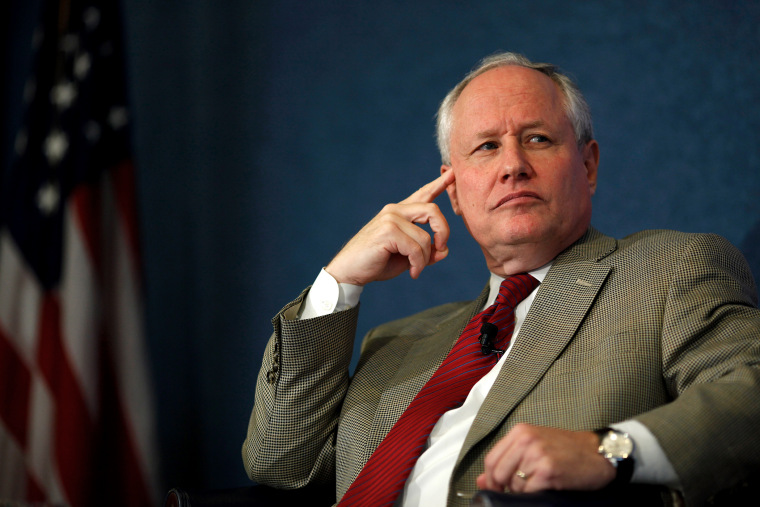Before the presidential campaign began in earnest, one of the more common phrases associated with the Republican field was "deep bench." The sports metaphor, repeated ad nauseum, was intended to convey a specific point about GOP politics: the far-right party is stacked with presidential-level talent, cultivated over several years.
According to the narrative, the result is the largest and most impressive presidential field in at least a generation, featuring 10 governors and four high-profile U.S. senators.
Oddly enough, no one seems to be talking about the party's "deep bench" anymore. At least for now, the dominant Republican candidate is a former reality-show host, who enjoys big leads in the polls. He's followed by an uninspiring and painfully rusty former governor, who happens to be the brother and son of unsuccessful presidents, and a retired neurosurgeon who has a bad habit of comparing the United States to Nazi Germany.
It's led to an unexpected dynamic: despite 17 Republicans vying for the Republican nomination, some in the party have begun to ask whether there might be better choices out there. The Weekly Standard's Bill Kristol published this new column over the weekend:
Shouldn't Republicans be open to doing what Democrats are now considering? That is: Welcoming into the race, even drafting into the race if need be, one or two new and potentially superior candidates? After all, if a new candidate or new candidates didn't take off, the party would be no worse off, and someone from the current field would prevail. If the October surprise candidate caught fire, it would be all the better for the GOP--whether he ultimately prevailed or forced one of the existing candidates to up his game. Who could such a mysterious dark horse be?
Don't worry, Kristol, one of the Beltway's highest-profile media Republicans, has some suggestions.
Kristol apparently has his eye on former Indiana Gov. Mitch Daniels, Rep. Paul Ryan (R-Wis.), Rep. Jim Jordan (R-Ohio), Rep. Trey Gowdy (R-S.C.), Rep. Mike Pompeo (R-Kan.), Sen. Tom Cotton (R-Ark.), retired Gen. Jack Keane, and, in all seriousness, Supreme Court Justice Samuel Alito.
"It may seem odd to suggest that the solution to an already unprecedentedly large field is to expand it further," the Weekly Standard's editor writes. "But politics is full of oddities."
And so are Bill Kristol columns.
I should mention for those unfamiliar with Kristol that, even among Beltway pundits, he's widely recognized for being wrong, about everything, all of the time. Even some conservatives joke about betting the house on the opposite of anything Kristol predicts. (Consider his recent track record on Trump, for example.)
In The Atlantic a couple of years ago, Conor Friedersdorf, himself a center-right journalist, explained quite clearly, "The GOP should always do the opposite of what Bill Kristol says."
My point, in other words, isn't to suggest that we should start waiting for the Republican field to swell to 18 or more candidates, just because Kristol floated the possibility. On the contrary, if Kristol thinks it's time for the GOP field to grow, it almost certainly means it's poised to shrink.
But what matters here is that Republicans have the largest field of presidential candidates in American history, and they're still not altogether satisfied with their lackluster choices. The "deep bench" is empty, and some in the party are turning their attention to the bleachers.
As for Kristol floating Alito as a possibility, I suspect there are millions of Americans ready to endorse any scenario that would force the right-wing jurist to give up his spot on the U.S. Supreme Court.
